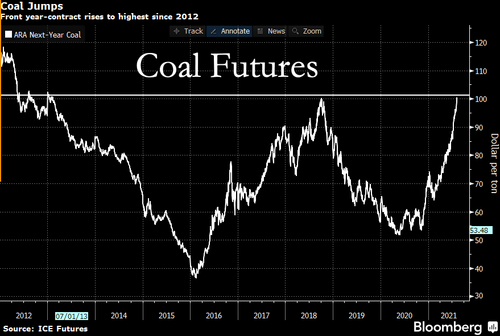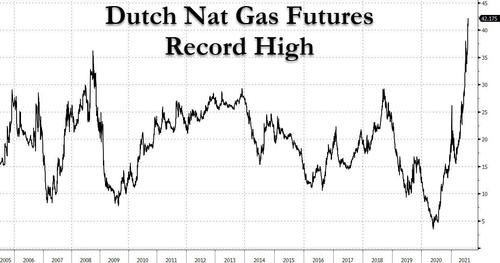Coal prices in Europe have soared to a nine-year high due to a combination of increasing demand and supply constraints.
Prices for front-year coal futures on ICE Futures Europe breached the $101 per ton mark, hitting levels not seen since 2012, according to Bloomberg.

This summer, demand for coal power generation has surged amid record heat waves across Europe and natural gas prices surging. Coal has become a much cheaper form of power generation since Russia has tighten gas markets and caused a supply storage crunch.

Fonte: Bloomberg
Supplies of coal are dwindling as power companies are building stockpiles ahead of Europe's winter heating season. At the same time, coal supplies from some emerging market countries have been disrupted due to social unrest and logistical issues.
Coal prices worldwide have surged this year. Prices for coal exported from Australia are at decade highs, while costs of coal imported into Europe from China have also risen.
The latest International Energy Agency report shows coal-fired electricity production will increase 3% in 2021 and 3% next year after declining by 4.6% last year. Not so ESG-friendly considering the continent is trying to decarbonize.
"Normally you have enough supply elasticity in the coal market that whatever happens in the gas market doesn't affect coal that much," said James Waddell, head of European gas at Energy Aspects Ltd. "But because stocks are so low in Europe, and you don't have any mechanism to bring more supplies quickly, gas is having a reciprocal effect on the coal market."
European front-month and front-quarter coal contracts have been trading above $100 per ton since mid-June. The continued supply issues are elevating prices for next year.
"Markets may have enjoyed decent demand but frequent supply disruptions also continued, reducing the ability to replenish depleted storage," said Andy Sommer, head of fundamental analysis and modeling at Swiss trader Axpo Solutions AG, in a report on Monday. "On the coal side, this was caused by social unrest and railway issues in Colombia and South Africa."
Suppose power generation companies are paying near-decade highs for coal and natgas. In that case, this means higher electricity prices will be passed down to European households, raising concerns that financially stretched households may feel the burn from higher electricity costs.
Commenti
Posta un commento